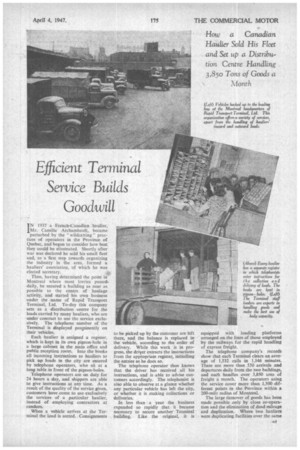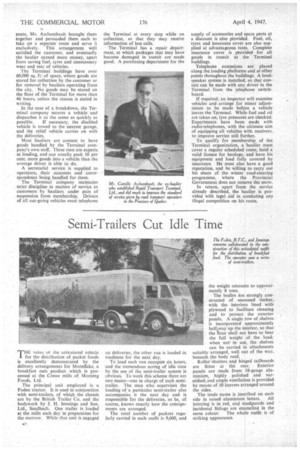Efficient Terminal Service Builds Goodwill
Page 35

Page 36

If you've noticed an error in this article please click here to report it so we can fix it.
IN 1937 a French-Canadian haulier, Mr. Camille Arehambault, became perturbed by the " wildcatting " practices of operators in the Province of Quebec, and began to consider how best they could be eliminated. Shortly after war was declared he sold his small fleet and, as a first step towards organizing the industry in the area, formed a hauliers' association, of which he was
elected secretary, Then, having determined the point in Montreal where most lorries passe& daily, he secured a building as near as possible to the centre of haulage activity, and started his own business under the name of Rapid Transport Terminal, Ltd. To-day this company acts as a distribution centre for the loads carried by many hauliers, who are under contract to use the service exclusively. The telephone number of the Terminal is displayed prominently on their vehicles.
Each haulier is assigned a register, which is kept in its own pigeon-hole in a large cabinet in the main office and public reception room. Into the books all incoming instructions to hauliers to pick up loads in the city are entered by telephone operators, who sit at a long table in front of the pigeon-hales.
Telephone operators arc on duty for 24 hours a day, and shippers are able to give instructions at any time. As a result of the quality of the service given, customers have come to use exclusively the services of a particular haulier, instead of employing contractors at random.
When a vehicle arrives at the Terminal the load is sorted. Consignments to be picked up by the customer are left /here, and the balance is replaced in the vehicle, according to the order of delivery. While this work is in progress, the driver extracts the instructions from the appropriate register, initialling the entries as he does so.
The telephone operator thus knows that the driver has received all his instructions, and is able to advise customers accordingly. The telephonist is also able to observe at a glance whether any particular vehicle has left the city, or whether it is making collections or deliveries.
In less than a year the business expanded so rapidly that it became necessary to secure another Terminal building. Like the original, it is equipped with loading platforms arranged on the lines of those employed by the railways for the rapid handling of express freight.
The telephone company's records show that each Terminal clears an average of 1,532 calls in 1,146 minutes. There are more than 550 arrivals and departures daily from the two buildings, and each handles over 3,850 Ions of freight a month. The operators using the service cover more than 1,500 different points in the Province within a 200-mile radius a Montreal.
The large turnover of goods has been made possible only by close co-operation and the elimination of dead mileage and duplication. Where two hauliers were duplicating facilities over the same route, Mr. Arehambault brought them together and persuaded them each to take on a separate route and serve it exclusively. This arrangement well satisfied the customer, and eventually the haulier earned more money, apart from saving fuel, tyres and unnecessary wear and tear of vehicles.
The Terminal buildings have over 60,000 sq. ft: of space, where goods are stored for collection by the customer or for removal by hauliers operating from the city. No goods may be stored on the floor of the Terminal for more than 46 hours; unless the reason is staled in writing.
In th.e case of a breakdown, the Terminal company secures a vehicle and dispatches it to the scene as quickly as possible. If necessary, the disabled vehicle is towed to the -nearest garage, and the relief vehicle carries on with the deliveries.
Most hauliers are content to have goods handled by the Terminal company's own staff. These men are experts at loading, and can usually pack 10 per cent. more goods into a vehicle than the average driver is able to do.
A secretarial service is supplied to operators, their accounts and correspondence being handled for them.
The Terminal company maintains strict discipline in matters of service to customers by hauliers. under pain of suspension from membership. Drivers of all out-going vehicles must telephone the Terminal at every stop while on collection, so that they may receive information of late calls.
The Terminal has a repair department, at which packages that may have become damaged in transit are made good. A purchasing department for the
supply of accessories and spare parts at a discount is also provided. Fuel, oil, tyres and insurance cover are also supplied at advantageous rates. Complete insurance cover, is provided for all goods in transit at the Terminal buildings.
Telephone extensions are placed along the loading platforms and at other points throughout the buildings. A loudspeaker system is installed, so that contat can be made with any driver in the Terminal from the telephone switchboard.
If required, an inspector will examine vehicles and arrange for minor adjustments to be made before a vehicle leaves the Terminal. While fuel and oil are taken on, tyre pressures are checked. Experiments have been made with radio-telephones, with the ultimate aim of equipping all vehicles with receivers. to improve service still further.
To qualify for membership of the Terminal organization, a haulier must cover a regular scheduled route, hold a valid licence for haulage, and have his equipment and load fully covered by insurance. He must also have a good reputation, and be willing to carry out his share of the winter road-clearing programme, where the Provincial Government does not remove the snow.
In return, apart from the service already described, the haulier is provided with legal_ aid in combating any illegal competition on his route.












































































